Skip to main content

SHI is a familiar name, with OEM ties and access to thousands of SKUs.
But from our customer conversations with Spotify, Seatgeek and others who are modern remote-first teams don’t need more SKUs or catalogs; they want every device to appear on time, work out of the box, and disappear securely when it’s not needed, all on autopilot. For scaling distributed teams, quoting tools, and bulk pricing aren’t enough. As one mid-market customer put it,
“They are not efficient and retain little knowledge about your past purchases to simplify the renewal process, billing/invoicing, etc.”
The problem is that SHI’s model was built for traditional IT procurement, not for the demands of lean, globally distributed teams. For companies scaling remote operations, that’s a costly mismatch (and we’ll cover why).
In this guide, we compare SHI with five modern alternatives. You’ll see how they stack up on automation, SLAs, global tracking, and cost transparency so your IT can reduce ticket overhead, and your Finance, HR, and Compliance teams never fight over missing data again.
See how teams like yours are reclaiming 2,300 annual IT hours, read Firstbase customer reviews.
For fast-growing distributed teams, SHI-type vendors create a hidden drain that doesn’t show up on a quote: time.
Their value lies in cost savings and SKU catalogs, but the workflows behind each order, refresh, or return are anything but efficient.
Take logistics alone: From our research, we have seen IT teams waste 500 hours per year for every 100 remote employees just managing shipping, imaging, and returns manually. Even retrieval is broken; most enterprises recover only 50–60% of devices, and monitors are almost never returned.
Meanwhile, ticket volume remains high. This clogs up IT bandwidth and stretches small teams to breaking point. In fact, 52% of IT teams say logistics prevent them from working on strategic projects.
SHI-type vendors simply can’t handle this. They were built for procurement, not for managing the full device lifecycle: procure → deploy → manage → retrieve.
For companies with global teams and lean IT, time is the hidden cost. And automation is the only way to get it back.
.png)
SHI can help you buy hardware, but once the box ships, the burden shifts back to you: lost laptops, silent couriers, and auditors asking, “Where’s the wipe cert?”
Even with custom servers sent in for imaging, customers report it’s still easier (and faster) to handle setup themselves. Some waited six weeks for equipment they could’ve gotten on Amazon in two days.
And worse, some of your preferred vendors aren’t on SHI’s list, and you’re stuck or overpaying.
The truth is, SHI wasn’t built for speed, automation, or distributed complexity. It was built to sell boxes at scale. For lean teams, that’s a dealbreaker.
Top SHI alternatives by who they’re built for: the modern, remote-first enterprise, and how well they automate and manage the lifecycle.
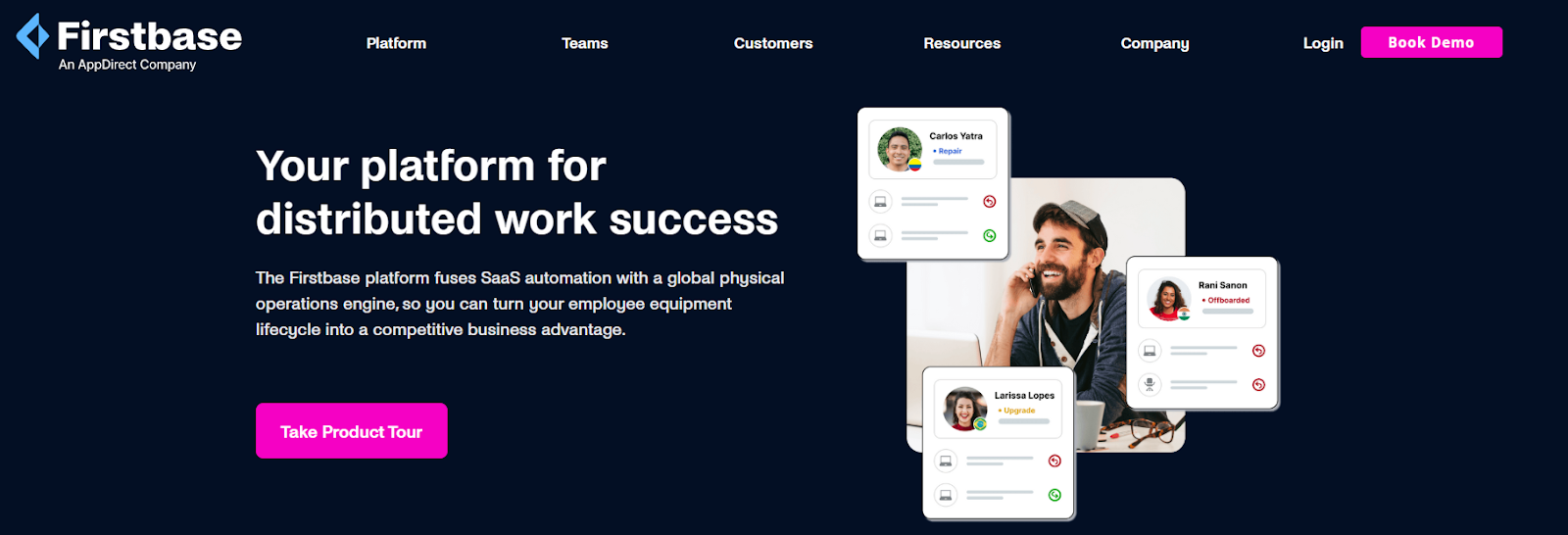
Firstbase is the industry’s leading platform for managing the complete lifecycle of employee equipment in distributed teams. From onboarding to offboarding, Firstbase automates procurement, deployment, management, and recovery while maintaining full visibility across assets. It combines global logistics with enterprise-grade SaaS workflows and deep integrations with top HRIS and ITSM systems.
The platform executes all physical operations and logistics (from pre-onboarding through offboarding) with vendor-neutral procurement options (purchase or lease through Firstbase, or ship your existing equipment), in Firstbase-run facilities worldwide.
If you’ve used SHI, you know that the quote is just the beginning. What comes after (missed SLAs, manual work, surprise freight) is where the real cost begins to appear. Here’s how Firstbase closes the gap that traditional resellers leave wide open.
Fast-growing remote-first teams (250- 5,000+ employees) who want to eliminate IT logistics overhead, reduce shadow IT risks, and achieve predictable per-seat costs with guaranteed global SLAs.
Let’s see what Firstbase users feel about the platform:
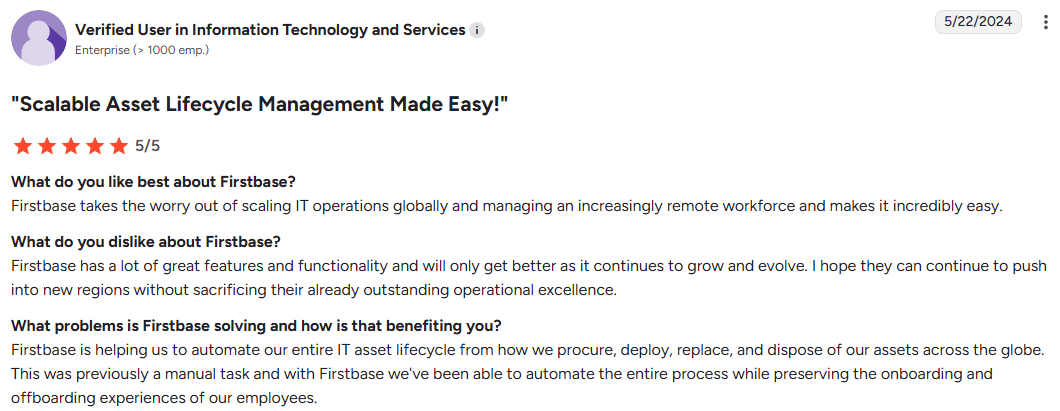
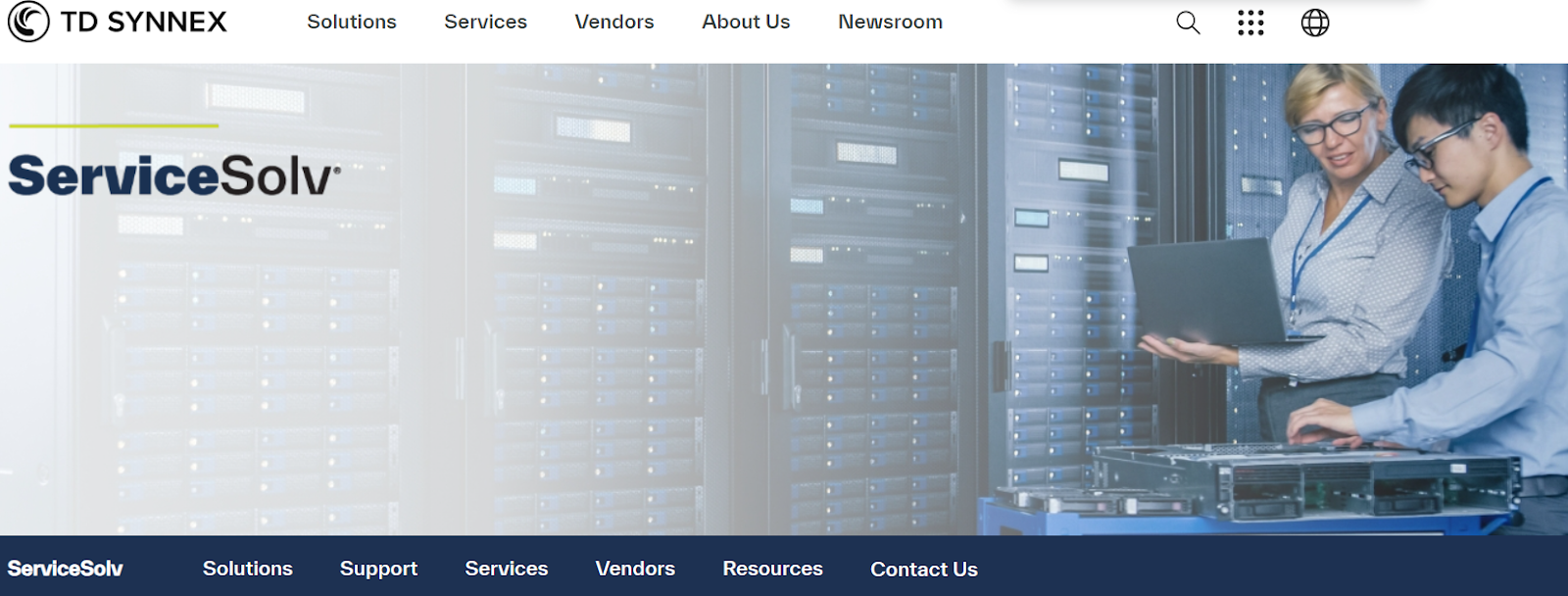
TD SYNNEX operates as a technology distributor partnering with 200,000+ edge-to-cloud products across the IT ecosystem. Through their ServiceSolv division, they provide lifecycle management services from initial design and integration through disposal.
Unlike pure resellers, TD SYNNEX combines OEM relationships with third-party maintenance strategies to extend equipment life beyond manufacturer end-of-service dates.
IT resellers and MSPs looking to add lifecycle services to their offerings without building in-house capabilities.
Here’s what users think about TD SYNNEX:
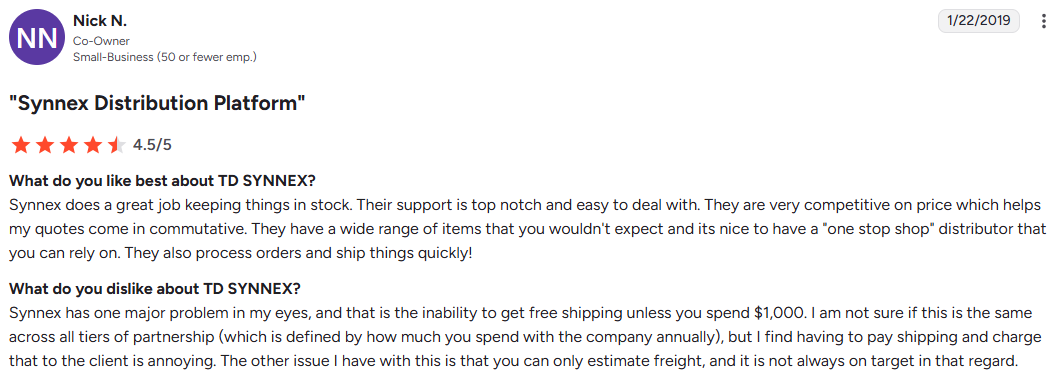

Ingram Micro is a global provider of IT lifecycle services across 57 countries. Its Lifecycle division focuses on extending the usable life of technology assets through secure, sustainable solutions, supporting a circular economy across industries. It offers end-to-end lifecycle services to help enterprises extend the life of IT assets through repair, refurbishment, and remarketing.
Large enterprises and global operators who need a traditional distributor with a focus on the circular economy.
Look at what their customers say:

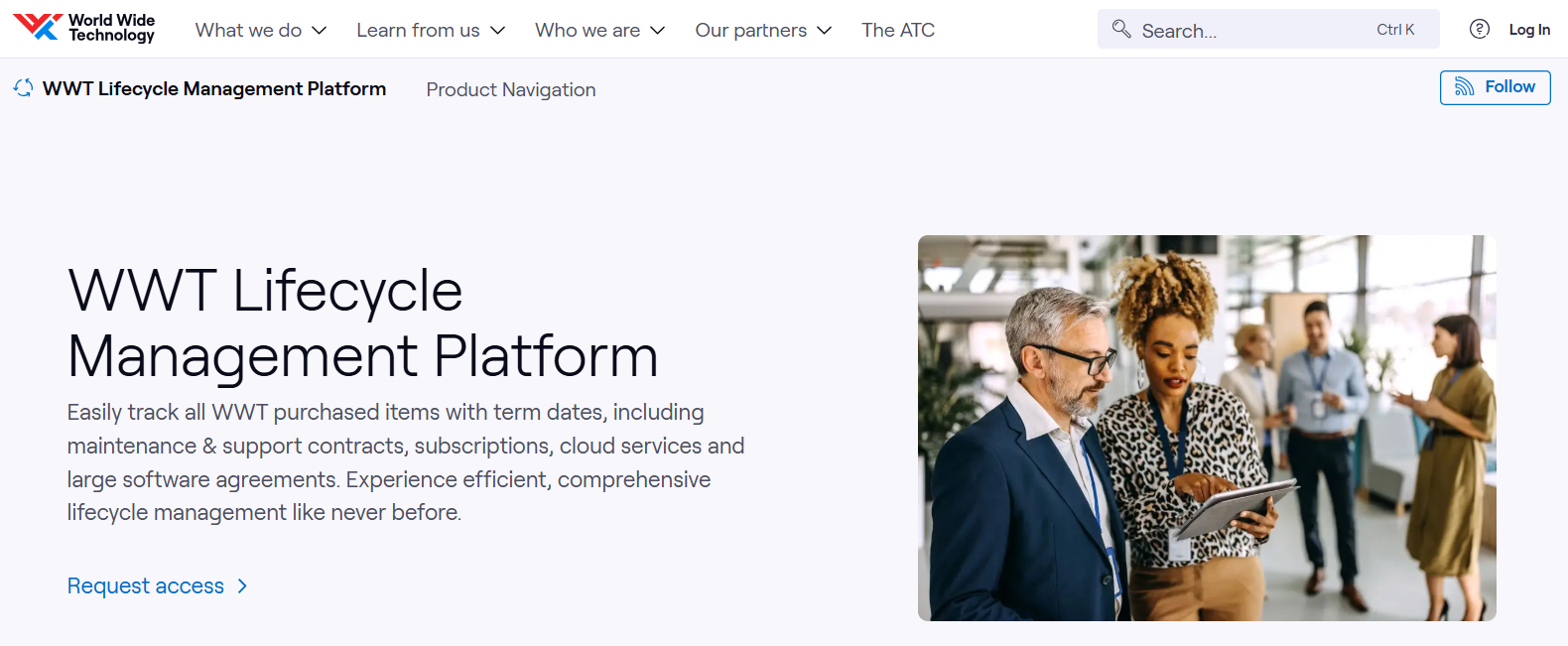
WWT is a technology solutions provider with over $10B in revenue, offering comprehensive lifecycle management alongside software development, AI, and cloud services. The platform tracks all WWT-purchased items, including maintenance contracts, subscriptions, and software agreements. Its global infrastructure supports localized delivery and full visibility into asset and contract status. However, its broad technology focus means device lifecycle automation isn't their core specialization.
Large enterprises with complex, multi-region tech stacks that need efficient contract visibility and enterprise-grade supply chain orchestration.


Kyndryl delivers comprehensive device management and lifecycle services across 50+ countries, supporting major platforms including Windows, macOS, iOS, Android, and ruggedized devices. Their solutions cover cloud, on-premises, and hybrid models, offering device-as-a-service and global logistics with zero or light-touch provisioning.
Organizations that want multi-platform device management with XLA-driven approaches to improve productivity, satisfaction, and engagement.
Here’s what Kyndryl customers think about the platform:

To truly support distributed teams, the right alternative needs to connect all IT, Finance, HR, and Compliance requirements.
If your IT team is lean and supports distributed employees, you’ll know that the time spent across procurement, deployment, and retrieval is two to four hours per device.
When you multiply that by hundreds of employees, ticket backlogs consume entire weeks. Traditional resellers further fragment this across five different vendor portals, resulting in zero unified visibility.
Here’s what to look for:
Firstbase customers report saving 700+ hours by removing the need to coordinate shipping, decommissioning, and redeployment manually. In just six months, Wise slashed IT ticket volume by 50% in just six months after switching to Firstbase’s unified platform.
“Zero-touch gives time back to the IT admin to spend on core initiatives, rather than shipping laptops,” says Austin Thurber, Firstbase IT Systems Engineer.
See how Firstbase helps IT teams reclaim their time. Check out zero-touch deployment.
For finance leaders, the right SHI alternative isn’t just the one with the lowest quote but also the one that delivers predictable, centralized, and audit-ready spend.
“Finance’s worst enemy is a lack of clarity on what’s happening, the more you can arm a finance team with up-to-date and auditable data, the more you equip them to increase performance.”
— John Pharr, VP of Finance, Firstbase
Reseller models often fragment costs across freight, retrieval failures, and high time sinks. These hidden costs rarely show up on vendor quotes, but they erode your margins.
And the pain doesn’t stop there. Manual workflows make it nearly impossible to tie device spend to functions like cost-per-hire or accurately forecast refresh cycles. Finance ends up chasing IT for data, and budget owners operate blind.
But Firstbase gives you:
Veramed, for example, scaled to 400 employees with only two IT staff, all while keeping costs and operations tightly aligned.
With reseller-style vendors, it’s not uncommon for laptops to arrive late (even two weeks or more after day 1). That delay disrupts onboarding and damages engagement.
According to SHRM, replacing a salaried employee can cost 6–9 months of their annual salary, and poor onboarding is one of the primary drivers. And when offboarding happens, unreturned gear adds security risks and hidden costs.
A smarter alternative like Firstbase solves this with automated Day‑1 readiness. The employee selects devices via self-service, and then they are delivered in 48 hours globally (fully configured and tracked). You can integrate directly with your HRIS, so onboarding kicks off the moment a new hire is added, without manual entry or missed steps.
Offboarding is just as seamless: automated retrievals, verified data wipes, and full inventory visibility ensure assets return safely. Your HR team doesn’t have to nudge ex-employees.
“The Firstbase team was able to build the integration to our HRIS in two weeks, and I was able to set it up in just 30 minutes. Now we’re able to automatically kick off onboarding as soon as an employee is added to our HRIS, which saves time and eliminates manual errors.”
— Tim Prouty, IT Support Manager, Varo
Security doesn’t end at procurement. For compliance-conscious teams, the right SHI alternative must offer full asset visibility from day one to secure disposal.
Traditional vendors often overlook offboarding logistics, yet every unreturned laptop represents a serious breach risk. Just ask Morgan Stanley, which faced a $35 million fine after mishandling decommissioned hardware.
Firstbase closes this gap with an automated retrieval flow: employees confirm their address, receive pre-labeled return kits, and schedule pickups from home. This drives near-100% return rates (as seen with Verse.ai) and significantly reduces inventory loss and security exposure.
The platform integrates with MDM tools like Kandji, Jamf, and JumpCloud to ensure that data is monitored and wiped before reuse. Firstbase also supports compliance with industry standards, including:
If security, governance, or audits are on your radar, choose a partner that protects devices, tracks them, and proves it.
Use this checklist to evaluate which platform truly supports your distributed team, across IT, Finance, HR, and Compliance.
✅ IT Ops
✅ Finance
✅ HR Ops
✅ Security & Compliance
If a vendor can’t check all these boxes, it’s not built for the way you work today.
SHI and similar resellers were built for traditional procurement, not for the full device lifecycle needs of modern, distributed teams. And that shows. From ticket backlogs and delayed onboarding to unreturned devices and surprise freight bills, the gaps are expensive.
Firstbase replaces all of that with automation. While SHI leaves you coordinating FedEx runs, we deliver 97% retrieval rates automatically. While they quote hardware costs, we include everything in predictable per-seat pricing.
The platform replaces fragmented workflows with end-to-end automation: zero-touch provisioning, real-time inventory visibility, and global device recovery with certified data wipes, all from one platform.
Reclaim 500+ IT hours and kill surprise freight bills. Book a 30-minute demo and get a personalized ROI forecast for every region you operate in.
.png)